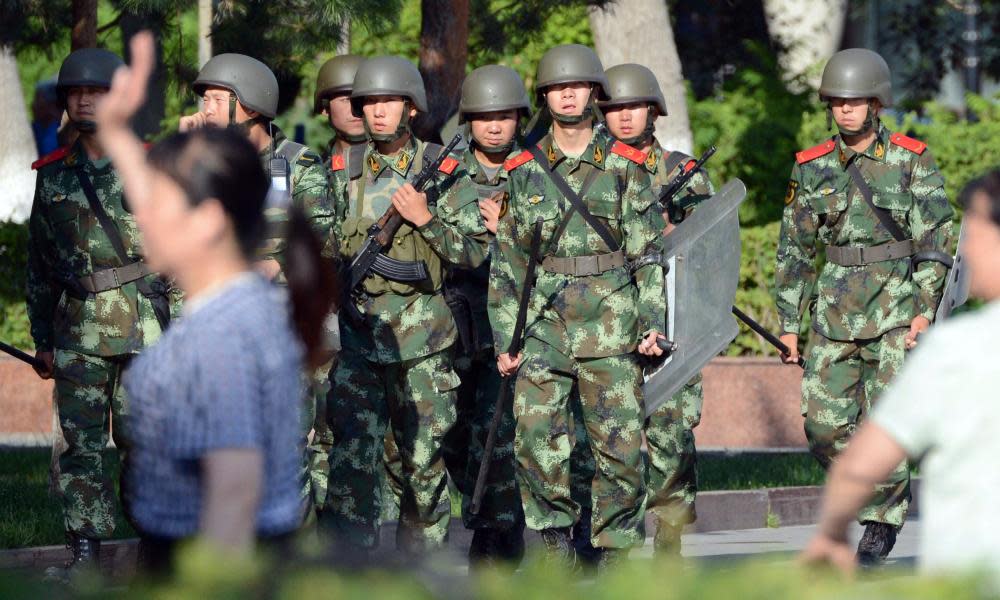Chinese troops stage show of force in Xinjiang and vow to 'relentlessly beat' separatists

Thousands of heavily armed troops have paraded through cities in China’s troubled far west with officials there vowing a “thunderous” anti-terror crackdown after an apparent upsurge in deadly ethnic violence.
Hundreds of black clad, rifle-toting soldiers took to the streets of Urumqi, the capital of Xinjiang, on Saturday, according to local media reports.
Zhu Hailun, the region’s deputy Communist party chief, told the assembly authorities would wage a unflinching campaign against the Islamic terrorists and separatists they blame for the bloodshed.
“We shall load our guns, draw our swords from their sheaths, throw hard punches and relentlessly beat, and strike hard without flinching at terrorists who must be brought down a peg or two,” Zhu was quoted as saying by the state-run Xinjiang Daily newspaper on Sunday.
“With the caring and strong leadership of the Communist Party Central Committee, where President Xi Jinping serves as the core … the strong support of 23m people from all ethnic groups in Xinjiang, and with the powerful fist of the People’s Democratic Dictatorship, all separatist activities and all terrorists shall be smashed to pieces,” Zhu added.
The Urumqi parade was the third such event to be staged in Xinjiang in under a week.
Thousands of troops paraded through Hotan, a city in southern Xinjiang, last Thursday while Kashgar, a Silk Road trading hub near China’s border with Kyrgyzstan, saw a similar march the following day.
“We are ready for [combat] and we definitely will win,” a Kashgar-based special forces operative named as Diar Dago told the Xinjiang Daily.
The parades come after two separate eruptions of bloodletting claimed more than a dozen lives in Xinjiang, a sprawling border region which has been blighted by repeated outbreaks of ethnic violence and terrorist attacks.
Last Tuesday three machete-wielding attackers were reported to have been gunned down by police after they killed five civilians in Hotan’s Pishan county.
On 28 December four assailants were reportedly shot dead after using home-made explosives to launch a deadly assault on a government compound in Karakax county.
China says Islamic extremists and separatists are behind such attacks although human rights activists suspect much of the violence is driven by resentment at Communist party rule among the region’s predominantly Muslim ethnic Uighur population.
James Leibold, a specialist in China’s ethnic policies from La Trobe University in Melbourne, said the spectacular anti-terror demonstrations were designed to reassure the domestic audience that authorities were in charge.
“The message is: ‘We are in control and Uighurs in particular had better not act out otherwise we have got tremendous resources at our disposal to round up and persecute any people who attempt to disrupt social stability and ethnic harmony’,” he said.
Leibold said he believed the show of force was also an attempt by Xinjiang’s new Communist party chief, Chen Quanguo, to project strength after his predecessor, Zhang Chunxian, was perceived to have been too soft on security issues.
“Chen has gone in the opposite direction with these military parades which are quite remarkable really … We saw similar-type events after the 2009 riots but here we are talking about in response to what was really a small knife attack in Hotan. So it is out of proportion, I would say, to the level of violence that we have seen in Xinjiang this year.”
China’s leaders declared a “people’s war on terror” in 2014 after a series of attacks that took place or were linked to Xinjiang.
Those incidents included a street bombing in Urumqi, a knife attack on civilians at a train station in Kunming, and a car-bomb attack in Beijing’s Tiananmen Square.
However, until the recent killings a period of relative calm appeared to have descended on the region.
Leibold said a likely explanation was the massive increase in surveillance there including some “quite spooky Orwellian stuff” such as grid management, face recognition software and big data analytics. “Xinjiang increasingly resembles a police state.”
Additional reporting by Wang Zhen

 Yahoo News
Yahoo News 
